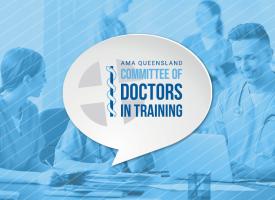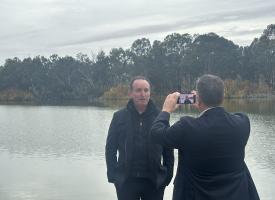Transcript - Dr Gannon - ABC Radio Perth - Reflections on the AMA Presidency
Transcript: AMA President, Dr Michael Gannon, ABC Radio Perth, with Paula Kruger, Wednesday 16 May 2018
Subject: Reflections on the AMA Presidency
PAULA KRUGER: Do you ever look at other people's lives, busy lives, and think: how do they have the time to do all of that? Is there something special that they're slipping into their organic smoothie in the morning, or have they found a way to bend the space-time continuum? Joining us now is a very busy man who has me thinking just that. His name is Dr Michael Gannon and he is the current national President of the AMA, but not for much longer. So that's the Australian Medical Association. It's one of the highest profile peak professional bodies, and he's also an obstetrician.
Michael Gannon, good morning, and thanks for joining us.
MICHAEL GANNON: Good morning, Paula.
PAULA KRUGER: So, what is more unpredictable, in your view: playing the political- dealing with the political bluster in Canberra or delivering babies?
MICHAEL GANNON: They're both very much unpredictable games, but if you invest in prevention, you can reduce problems in both games.
PAULA KRUGER: In both games [laughs].
MICHAEL GANNON: Yeah, so being smart and predicting problems in delivering care to pregnant women and to gynaecological patients is smart; delivering preventative health care on a population level is smart; and I think the same comes when it comes to representing my colleagues, representing the medical profession, representing our patients. Do the hard work, do the research, and you'll usually reap a dividend when it comes to politicians making the decisions they'll make.
PAULA KRUGER: It is a very big gig being President of the AMA. So how do you handle that? Because you've continued to be an obstetrician at St John of God in Subiaco on the side. How can you hold those two positions at once?
MICHAEL GANNON: Well, it's very difficult. That's the first thing that needs to be said, and there are things you have to give up. So, I worked at Osborne Park Hospital for 11 years and I gave up that job to be able to do it. I've reduced my income substantially and reduced the number of patients that I see in my private rooms. So I've halved the size of both my jobs, and that enables me to give my full energies to the national job. I do get on planes a lot. The way I explained it to people is roughly three weeks out of four. I added the trips up last week.
PAULA KRUGER: So three weeks out of four that you're away?
MICHAEL GANNON: Yes, so I'll probably get on a plane at least three weeks out of four, and that's usually Sydney, Melbourne, or most commonly Canberra, where our head office is. But I rely a lot on support. My wife takes on the burden of raising our two children. I miss many parent-teacher interviews. My dad goes to footy training. My colleagues in the hospital have been a fabulous supporter of mine. Every week one of them gets a phone call saying I'm getting on a plane on Tuesday or Wednesday or Thursday, do you mind keeping an eye on my patients? And again, I'm very, very happy to report the loyalty of my long-suffering patients who get told: no, I'm sorry, this is the only time we can have an appointment. I might not be there when you go into labour, but I've done my very best to continue to provide the highest levels of care, recognising that there's been compromises along the way.
PAULA KRUGER: Just on that personal note, you mentioned your wife there, and in order for you to have this- you know, to fulfil this challenging role, she has had to take a lot of the load, but she's a doctor herself, isn't she?
MICHAEL GANNON: Yeah, so my wife's a GP and she's shouldered the load for many years, because the fact is that private obstetrics demands you being ready to stop what you're doing and attend the hospital within 10 to 15 minutes. That is sometimes the timeframes in which we need to act. Now, we're not unique like that. My cardiologist colleagues are like that. There are other examples of doctors that need to be able to respond within 20 or 30 minutes, so that provides huge challenges to their families. And I think that one of the things about the job of the AMA Presidency is that there's a lot of criticism - a lot of it healthy from within the membership, from within the profession - but I don't think people quite realise the sacrifices that you make personally and that the people who support you make. I'm talking about a job that I've invested 50-plus hours a week in. It's not everything to everybody, as anyone who's headed up a membership organisation will assert to you. These jobs are difficult.
One thing I will say about my wife, she's a GP and she's a very loyal member of the AMA, and I think that in her contribution to my Presidency she's done more than just about every other Councillor around the country.
PAULA KRUGER: So, you've been in the role for two years, is that the case? And so when you went into the role, what were you hoping to achieve?
MICHAEL GANNON: Well, I had a lovely eight days where I was WA President and National President, so for the five years prior to this I was Vice President of the AMA in WA and then State President. So it's been a seven-year journey. Look, I really very much wanted the AMA to focus in on health policy. It's a very difficult balance to have because there are so many social determinants of health. So we find ourselves frequently commenting on social policy and being at the edge of what is genuine health policy, but investments in prevention, investments in the way we look after the most vulnerable in our community, actually save money in the health system. So you have to find that very delicate balance in appropriately commenting on social issues but not overreaching.
PAULA KRUGER: Are you suggesting that before you were in the role that maybe the balance was wrong when it came to the AMA commenting on social policy?
MICHAEL GANNON: I think that the AMA and my predecessor Professor Brian Owler had it about right in commenting on social policy, but we had a problem that the relationship with the Federal Government had broken down, and so I sought election determined to fix that. So I worked well first with Minister Sussan Ley, and then very effectively when she was replaced by Greg Hunt. Greg Hunt has been an outstanding Health Minister. He certainly hasn't given the AMA everything it wants, nor is that his job, but he's been a very, very effective Minister, and I've been able to bring him to a greater understanding of an extremely complex portfolio, both because of his intellect, but more importantly his willingness to listen. Health Ministers at State and Commonwealth level who listen to doctors are usually the most effective Health Ministers. We are there to help them, and I'm aware around the country there are relationships that aren't as strong as they are between the AMA and the State Governments, and that is to the detriment of the human beings that are their voters, their citizens, and our patients.
PAULA KRUGER: How do you work closely with the Government to make sure you have an effective working relationship, without being seen as being too close to the Government?
MICHAEL GANNON: Well, I think the truth is you never get everything you want from government, and what you need to be is to be mature enough to disagree on an issue and then move on to the next issue. There'll be areas of broad agreement and engagement, there'll be areas of furious disagreement, but you need to be mature enough to deal with those issues and then move on to the next one. It is not the AMA's job to curry favour with the Government. Indeed, it's not the AMA's job to curry favour with the Opposition or the crossbench. You need to have positive working relationships across the political spectrum, because they all become important. The Opposition is the alternative government. The crossbench, at State level and Commonwealth level, is very influential in our current politics in deciding whether or not political measures get through. So one of the things I've worked hard on, and the AMA well before me, well after me, has engaged deeply with all sides of politics to try and get the right outcomes.
PAULA KRUGER: Dr Michael Gannon, in your role as National President of the Australian Medical Association, were there are times where you felt you got that political balance a bit wrong?
MICHAEL GANNON: No, I don't think so. I think that you get criticised in equal measure by all sides of politics. I've got an insight into perhaps how difficult the job is for politicians. I remember as a fairly green Councillor of the AMA, I described the Health Minister at the time as being pretty thin-skinned or having a glass jaw. You'd think that people in the rough and tumble of politics would be used to criticism. But the reality is it's actually very difficult, and the immediacy of social media, the anonymity of social media, has given a new opportunity for cowards and for people who don't really understand the issues at any great depth to send their bile and hate to different levels.
PAULA KRUGER: Yes, and you experienced some of the- you know, recently on social media you came under some criticism when you, on Twitter, commented on Victoria's assisted dying laws. So what specifically was that tweet and was it withdrawn?
MICHAEL GANNON: Well, that tweet got a lot of prominence. The problem with Twitter, it's such an unsophisticated beast. I think we've got 280 characters to try and make an argument now. It's a very, very effective tool that can reach people very widely, very quickly. But that tweet I guess referred to the fact that there has been an absolute dearth of intellectual depth applied to the issue of euthanasia and physician-assisted suicide. I mean, we've seen a media circus in the last two weeks broadly celebrating the suicide of an individual. We need to look at these issues in greater depth. Countries around the world that have legalised euthanasia and physician-assisted suicide have normalised suicide, and they not only have a higher and higher proportion of their citizens dying in this way, but they have higher and higher suicide rates.
We need more intellectual depth when we look at social policy issues. Everyone has the right to their opinion, but sometimes we see people yelling names when it comes to looking at difficult social debates, and this is one area where we have not seen the intellectual vigour we need to work out what the world might look like three years, five years, ten years after these kind of laws might be introduced.
PAULA KRUGER: So the role that you have, it's a role where personal politics shouldn't play a part. So in this context, where you commented on Victoria's assisted dying laws, do you think you managed to do that? To keep your personal politics separate from the role?
MICHAEL GANNON: Well, the thing about the AMA is that- I've noticed this on many occasions, people think that the President wakes up one morning and thinks: yeah look I think I'll talk about marriage equality today, or I think I'll talk about euthanasia today. The reality is that underlying everything that I say as President is a very highly researched book of policies and Position Statements, some of them developed by doctors more than five years ago. We update our policies and statements every five years. We've got eight State and Territory AMAs that contribute to this. The AMA is the only organisation in Australia that can take the opinions of medical students, surgeons, psychiatrists, gastroenterologists, GPs, gynaecologists - put them all together. People who work in the public system, people who work in the private system, people who work in health agencies and in the community. Those policies are very carefully put together and that policy book stands behind the President. It's my job to prosecute the argument in that work that's been done by people around me and before me.
PAULA KRUGER: It's five minutes to ten. You're on ABC Radio Perth in WA and we're talking to Dr Michael Gannon who is the outgoing National President of the Australian Medical Association. You mentioned that this role gave you the opportunity to see how difficult things are for politicians. Is that a career path that you'd take yourself? Are you looking at a career in politics?
MICHAEL GANNON: Look I've been asked this question a couple of times in the last fortnight. It's almost inevitable that AMA Presidents who engage so deeply at the pointy end of Canberra politics get asked it. I've got Malcolm Turnbull's number on speed dial. I've got Bill Shorten's number on speed dial. They don't get too many calls from me. So it's inevitable that we get asked and some of my predecessors have embarked on political careers. I live one street away from the member for Perth, who stood down citing family reasons. I wish Tim Hammond the best in his next career. I think I've had a two-year experience of being a Federal politician in Canberra. It's a difficult job. It's a slightly overrated job. It's very cold. It's not paid well enough. Look, I've got a lot of time for politicians. I reject the world held aphorism that they're good people to start with then something bad happens. They are near universally thoroughly decent people who work very hard on behalf of their citizens. Some of them have crazy ideas, but I don't see it in my future. Having said that, I've had this amazing opportunity mid-career. I'm only young. I don't know what life looks like in five years, ten years, fifteen years, but it's certainly not on my immediate radar.
PAULA KRUGER: Yes, so we'll rule it out in the short term, but who knows in the long term.
MICHAEL GANNON: You never know what the world looks like in seven years' time or fifteen years' time. In my first…
PAULA KRUGER: [Interrupting] Or if there's a Federal Election in maybe a year's time, is that too soon?
MICHAEL GANNON: Look, as I said to a senior member of the Cabinet at a function last year who asked me this very question, I said: you're assuming you know which side of politics I'll stand for, which he doesn't know. It's not the AMA President's job to play favourites when it comes to politics. And certainly- people interpret your commentary in a certain way. But I've been accused of being a Green and a horrible LNP totalitarian and everything in between over the past two years. Our job is to engage with all sides of politics.
PAULA KRUGER: Well, usually, if you're upsetting everyone you're doing something right then, aren't you?
MICHAEL GANNON: Yeah, that's what we always say. And in the AMA we say: when the GPs complain, you're all about specialists, and the specialists complain, you're all about GPs. If you're being abused by left and right on the same day, you're probably doing a good job.
PAULA KRUGER: Well, I'm going to take that as a not quite ruling out a political career in the short term but- in the longer term but obviously there'll be a decision made very shortly on the new AMA President.
MICHAEL GANNON: Yes, so there's an election Sunday week. I have not anointed a successor. I know all three men very well. We are overdue for another woman President, but not this time. But look, I wish my successor well and I'll be there to help them to do a great job in an organisation that I think the world of, and an organisation that is such a positive influence on the Australian community. I wish it the best.
PAULA KRUGER: Dr Michael Gannon, thanks for your time today and I hope you enjoy the extra time that you'll have with your family.
16 May 2018
CONTACT: John Flannery 02 6270 5477 / 0419 494 761
Maria Hawthorne 02 6270 5478 / 0427 209 753
Follow the AMA Media on Twitter: http://twitter.com/ama_media
Follow the AMA President on Twitter: http://twitter.com/amapresident
Follow Australian Medicine on Twitter: https://twitter.com/amaausmed
Like the AMA on Facebook https://www.facebook.com/AustralianMedicalAssociation



